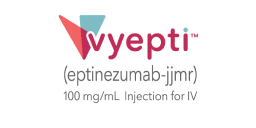2.1 Recommended Dosing
The recommended dosage is 100 mg administered by intravenous infusion every 3 months. Some patients
may benefit from a dosage of 300 mg administered by intravenous infusion every 3 months.
2.2 Dilution Instructions
VYEPTI requires dilution prior to administration. Dilute only in 100 mL 0.9% Sodium Chloride
Injection, USP. The infusion bags must be made of polyvinyl chloride (PVC), polyethylene (PE), or
polyolefin (PO). Use appropriate aseptic technique when preparing VYEPTI solution for intravenous
infusion. VYEPTI single-dose vials contain no preservative; discard unused portion remaining in the
vial.
Dilution
100 mg dose:
To prepare the solution, withdraw 1 mL of VYEPTI from a single-dose vial using a sterile needle and
syringe. Inject the 1 mL content into a 100 mL bag of 0.9% Sodium Chloride Injection, USP.
300 mg dose:
To prepare the solution, withdraw 1 mL of VYEPTI from each of 3 single-dose vials using a sterile
needle and syringe. Inject the resulting 3 mL content into a 100 mL bag of 0.9% Sodium Chloride
Injection, USP.
Storage and Handling of Diluted Product
Gently invert the VYEPTI solution to mix completely. Do not shake. Following dilution, VYEPTI
solution must be infused within 8 hours. During this time, VYEPTI solution should be stored at room
temperature, 20°C to 25°C (68°F to 77°F). Do not freeze.
5.1 Hypersensitivity Reactions
Hypersensitivity reactions, including angioedema, urticaria, facial flushing, and rash, have
occurred with VYEPTI in clinical trials. Most hypersensitivity reactions occurred during infusion
and were not serious, but often led to discontinuation or required treatment. Serious
hypersensitivity reactions may occur. Cases of anaphylaxis have been reported in the postmarketing
setting. If a hypersensitivity reaction occurs, consider discontinuing VYEPTI and institute
appropriate therapy [see Contraindications (4) and Patient Counseling Information (17)].
Mauris mauris ante, blandit et, ultrices a, suscipit eget, quam. Integer
ut neque. Vivamus nisi metus, molestie vel, gravida in, condimentum sit
amet, nunc. Nam a nibh. Donec suscipit eros. Nam mi. Proin viverra leo ut
odio. Curabitur malesuada. Vestibulum a velit eu ante scelerisque vulputate.
6.1 Clinical Trials Experience
Because clinical trials are conducted under widely varying conditions, adverse reaction rates
observed in the clinical trials of a drug cannot be directly compared to rates in the clinical
trials of another drug and may not reflect the rates observed in clinical practice.
The safety of VYEPTI was evaluated in 2076 patients with migraine who received at least one dose of
VYEPTI, representing 1615 patient-years of exposure; of these, 1524 patients were exposed to 100 mg
or 300 mg. Across all doses, 1872 patients were exposed for at least 6 months and 991 patients were
exposed for 12 months. In the placebo- controlled clinical studies (Study 1 and Study 2) of 1372
patients, 579 patients received at least one dose of VYEPTI 100 mg, 574 patients received at least
one dose of VYEPTI 300 mg, and 588 patients received placebo [see Clinical Studies (14)].
Approximately 86% were female, 89% were white, and the mean age was 40.4 years at study entry.
The most common (incidence at least 2% and at least 2% greater than placebo) adverse reactions in
the clinical trials for the preventive treatment of migraine were nasopharyngitis and
hypersensitivity.
Table 1 summarizes the adverse reactions that occurred during Study 1 and Study 2.
In Study 1 and Study 2, 1.9% of patients treated with VYEPTI discontinued treatment because of
adverse reactions [see Warnings and Precautions (5.1)].
6.2 Immunogenicity
As with all therapeutic proteins, there is potential for immunogenicity. The detection of antibody
formation is highly dependent on the sensitivity and specificity of the assay. Additionally, the
observed incidence of antibody (including neutralizing antibody) positivity in an assay may be
influenced by several factors, including assay methodology, sample handling, timing of sample
collection, concomitant medications, and underlying disease. For these reasons, comparison of the
incidence of antibodies to eptinezumab-jjmr in the studies described below with the incidence of
antibodies in other studies or to other products may be misleading.
In patients receiving VYEPTI 100 mg or 300 mg every 3 months, the incidence of
anti-eptinezumab-jjmr antibody development in Study 1 (up to 56 weeks) was 20.6% (92/447), and 41.3%
(38/92) of those patients developed anti- eptinezumab-jjmr neutralizing antibodies. In Study 2 (up
to 32 weeks), the incidence of anti-eptinezumab-jjmr antibody development was 18.3% (129/706), and
34.9% (45/129) of those patients developed anti-eptinezumab-jjmr neutralizing antibodies. In an
open-label study with 84 weeks of treatment, 18% (23/128) of patients developed
anti-eptinezumab-jjmr antibodies, and 39% (9/23) of those patients developed anti-eptinezumab-jjmr
neutralizing antibodies.
Although the results from both studies showed no clear evidence of an impact from development of
anti-eptinezumab-jjmr antibodies, including neutralizing antibodies, on the safety and efficacy
profiles of VYEPTI, the available data are too limited to make definitive conclusions.
6.3 Postmarketing Experience
The following adverse reactions have been identified during postapproval use of VYEPTI. Because
these reactions are reported voluntarily from a population of uncertain size, it is not always
possible to reliably estimate their frequency or establish a causal relationship to drug exposure.
Immune System Disorders – Anaphylaxis [see Contraindications (4) and Warnings and Precautions
(5.1)].
Mauris mauris ante, blandit et, ultrices a, suscipit eget, quam. Integer
ut neque. Vivamus nisi metus, molestie vel, gravida in, condimentum sit
amet, nunc. Nam a nibh. Donec suscipit eros. Nam mi. Proin viverra leo ut
odio. Curabitur malesuada. Vestibulum a velit eu ante scelerisque vulputate.



